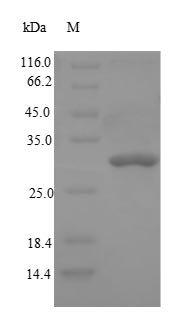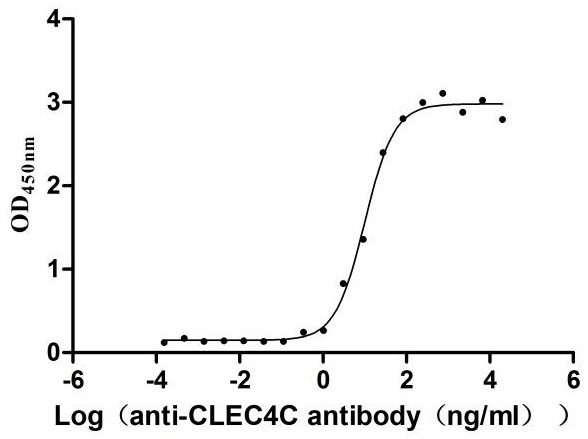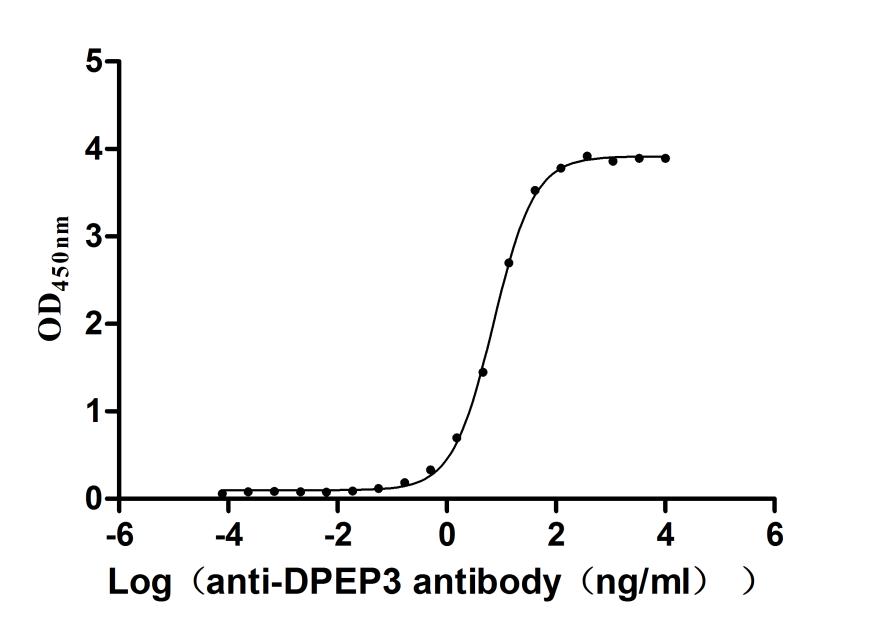Recombinant Rat Dipeptidyl peptidase 4 (Dpp4), partial
In Stock Promotion-
中文名稱(chēng):大鼠Dpp4重組蛋白
-
貨號(hào):CSB-EP007139RA
-
規(guī)格:¥2328
-
促銷(xiāo):
-
圖片:
-
其他:
產(chǎn)品詳情
-
純度:Greater than 90% as determined by SDS-PAGE.
-
基因名:
-
Uniprot No.:
-
別名:Dpp4; Cd26; Dipeptidyl peptidase 4; Bile canaliculus domain-specific membrane glycoprotein; Dipeptidyl peptidase IV; DPP IV; GP110 glycoprotein; T-cell activation antigen CD26; CD antigen CD26
-
種屬:Rattus norvegicus (Rat)
-
蛋白長(zhǎng)度:Partial
-
來(lái)源:E.coli
-
分子量:30.7kDa
-
表達(dá)區(qū)域:638-767aa
-
氨基酸序列SMVLGSGSGVFKCGIAVAPVSRWEYYDSVYTERYMGLPTPEDNLDHYRNSTVMSRAENFKQVEYLLIHGTADDNVHFQQSAQISKALVDAGVDFQAMWYTDEDHGIASSTAHQHIYSHMSHFLQQCFSLR
Note: The complete sequence including tag sequence, target protein sequence and linker sequence could be provided upon request. -
蛋白標(biāo)簽:N-terminal 6xHis-SUMO-tagged
-
產(chǎn)品提供形式:Liquid or Lyophilized powder
Note: We will preferentially ship the format that we have in stock, however, if you have any special requirement for the format, please remark your requirement when placing the order, we will prepare according to your demand. -
緩沖液:If the delivery form is liquid, the default storage buffer is Tris/PBS-based buffer, 5%-50% glycerol.
Note: If you have any special requirement for the glycerol content, please remark when you place the order.
If the delivery form is lyophilized powder, the buffer before lyophilization is Tris/PBS-based buffer, 6% Trehalose. -
儲(chǔ)存條件:Store at -20°C/-80°C upon receipt, aliquoting is necessary for mutiple use. Avoid repeated freeze-thaw cycles.
-
保質(zhì)期:The shelf life is related to many factors, storage state, buffer ingredients, storage temperature and the stability of the protein itself.
Generally, the shelf life of liquid form is 6 months at -20°C/-80°C. The shelf life of lyophilized form is 12 months at -20°C/-80°C. -
貨期:3-7 business days
-
注意事項(xiàng):Repeated freezing and thawing is not recommended. Store working aliquots at 4°C for up to one week.
-
產(chǎn)品描述:
Just like other recombinant proteins, the production of this recombinant Rat Dpp4 protein began with appropriate cDNA and PCR methods, and then the Dpp4 expression plasmids were built. Following sequence determination of the constructs, plasmids were transformed into E.coli for the expression of the recombinant Rat Dpp4 protein. N-terminal 6xHis-SUMO tag was used in the process. And we finally get the protein of interest with purity of 90%+.
Dpp4 is a gene providing an instruction of making a protein named dipeptidyl peptidase 4 in rattus norvegicus (rat). Dipeptidyl peptidase 4 is also known as bile canaliculus domain-specific membrane glycoprotein, dipeptidyl peptidase IV (DPP IV), GP110 glycoprotein and T-cell activation antigen CD26 (CD26). This protein can be cleaved into 3 chains, including dipeptidyl peptidase 4 membrane form, dipeptidyl peptidase 4 soluble form and dipeptidyl peptidase 4 60 kDa soluble form. It is involved in many biological processes, such as cell adhesion, endothelial cell migration, T cell activation, etc.
-
Datasheet & COA:Please contact us to get it.
相關(guān)產(chǎn)品
靶點(diǎn)詳情
-
功能:Cell surface glycoprotein receptor involved in the costimulatory signal essential for T-cell receptor (TCR)-mediated T-cell activation. Acts as a positive regulator of T-cell coactivation, by binding at least ADA, CAV1, IGF2R, and PTPRC. Its binding to CAV1 and CARD11 induces T-cell proliferation and NF-kappa-B activation in a T-cell receptor/CD3-dependent manner. Its interaction with ADA also regulates lymphocyte-epithelial cell adhesion. In association with FAP is involved in the pericellular proteolysis of the extracellular matrix (ECM), the migration and invasion of endothelial cells into the ECM. May be involved in the promotion of lymphatic endothelial cells adhesion, migration and tube formation. When overexpressed, enhanced cell proliferation, a process inhibited by GPC3. Acts also as a serine exopeptidase with a dipeptidyl peptidase activity that regulates various physiological processes by cleaving peptides in the circulation, including many chemokines, mitogenic growth factors, neuropeptides and peptide hormones. Removes N-terminal dipeptides sequentially from polypeptides having unsubstituted N-termini provided that the penultimate residue is proline.
-
基因功能參考文獻(xiàn):
- Study demonstrates that gestational glucocorticoid (GC) exposure during late pregnancy induced impaired glucose homeostasis that is accompanied by increased endoglin levels, atherogenic dyslipidemia and pancreatic beta cell dysfunction, increased DPP-4 activity and altered foetal outcome. Therefore, GC-induced glucose deregulation and inflammation during late gestation is through endoglin-/DPP-4-dependent pathway. PMID: 29677638
- Proteome profile array screening further revealed that DPPIV decreases matrix metalloproteinase-9, a key downstream effector of ERK-AKT signaling pathways PMID: 27525674
- results suggest that long-term exposure to DPPIV inhibitors looks compatible with an overall balanced metabolism PMID: 28895067
- Bis-Pyrano Prenyl Isoflavone Improves Glucose Homeostasis by Inhibiting Dipeptidyl Peptidase-4 in Hyperglycemic Rats PMID: 27238050
- The study demonstrates that the DPP4 inhibitor has a neuroprotective effect against hyperthermia-induced seizures by reducing the astrocyte-mediated inflammatory response by an NF-kappaB-dependent pathway. These properties are of significant clinical value and help explain the increasing evidence that DPP4 is involved in the incidence and progression of febrile seizures. PMID: 28372289
- DPP-4 inhibition with linagliptin may represent a novel treatment for chronic kidney disease. PMID: 27083282
- DPP4 inhibition protects against ventricular arrhythmias by attenuating NGF-induced sympathetic innervation via cAMP/PKA/CREB-dependent antioxidant pathway in non-diabetic infarcted rats. PMID: 26399925
- Dipeptidyl peptidase-4 inhibition by gemigliptin exerts a preventative effect on the proliferation and migration of VSMCs via Nrf2. PMID: 26187356
- Differences in Expression of DPP4 in Steatotic Rat Liver Are Not Related to Differences in the Methylation of its Gene Promoter PMID: 26359413
- The inhibition of the renal DPP-4 activity induced by saxagliptin may contribute to ameliorating renal injury in hypertension-related renal injury. PMID: 25936515
- Inhibition of DPP-4 reduces T2DM-induced increase in post-MI acute mortality possibly by restoring the autophagic response through attenuation of Bcl-2-Beclin-1 interaction. PMID: 26259714
- DPP4 inhibitor vildagliptin attenuates oxidative stress and cardiac fibrosis and improving cardiac function in rats with chronic myocardial infarction. PMID: 25823534
- Findings indicate a positive correlation between reduced stress-responsiveness and increased central NPY, in DPP4mut rats. PMID: 25635612
- DPP-4 inhibitors reduced macrophage infiltration via glucagon-like peptide-1-dependent signaling in nephritis model and suggest that the control of inflammation by DPP-4 inhibitors is useful for the treatment of nondiabetic kidney disease models. PMID: 25656369
- bone marrow derived cells but not the kidney represent at least one source of sDPP4. And leukocyte or macrophage subpopulations could be potential candidates. PMID: 24874705
- DPP4 regulates the expression of the hemoglobin genes, and might play a role in the preservation of renal function. PMID: 25122001
- Maternal deprivation as a model for postnatal stress experience influences remarkably postnatal lung development of rats, which is significantly modulated by the DPP4-system. PMID: 24357522
- Long term deficiency of DPP4 activity improved cardiac performance against pressure overload in rat. PMID: 24416433
- a low level of DPPIV activity contributed to maintaining intestinal homeostasis PMID: 23832365
- Circulating DPPIV activity is associated with poorer cardiovascular outcomes in heart failure. PMID: 23894014
- High fat and high cholesterol diets increased DPP-IV expression in intestinal lymph. PMID: 23535306
- DPP-IV is a promising in situ marker of biliary functionality not only of normal but also of fatty rats. PMID: 23361237
- Long term loss of DPP4 activity increased the capability against ROS stress, which was more than GLP-1 dependent pathway PMID: 23359639
- DPP-4 deficiency restored ischemia (but not G-CSF)-induced stem cell mobilization and improved vascular recovery in diabetic animals PMID: 23184393
- These data suggest that GLP-1 analogs may serve as a novel therapeutic drug to alleviate obesity-induced liver injury by reducing bile acid synthesis and improving liver bile secretory function. PMID: 22918684
- Dipeptidyl peptidase IV regulates proliferation of preglomerular vascular smooth muscle and mesangial cells. PMID: 22802229
- novel evidence shows the regulatory roles of DPP4 in chronic heart failure. PMID: 23035207
- Seven days post artery occlusion, dipeptidyl peptidase IV immunoreactivity was found in the perikarya of surviving cortical neurons of the ipsilateral hemisphere. PMID: 22373413
- APN and DPPIV activity levels are related to the development of arthritis, being protective or inducer of the susceptibility PMID: 21982785
- This study demonstrates a reduction of anabolic effects on the energy homeostasis and a centrally enhanced NPY-expression in DPP4-deficient rats under high caloric food intake. DPP4-deficiency altered intracorporal fat distribution. PMID: 20887754
- plasma DPP4 activity changes in accordance with the progression of hyperinsulinemic obesity and pancreatic islet atrophy PMID: 21139073
- Monosodium glutamate and/or food deprivation decreased the activity of dipeptidyl peptidase 4 in the soluble and membrane fraction from the hypothalamus, and in the membrane fraction from the hippocampus. PMID: 20153005
- Reduced airway inflammation in CD26-deficient F344 rats appear to be mediated by differences in the recruitment and activity of Tregs. PMID: 20560982
- APM and DPPIV-DI are respectively related to the downregulation of somatostatin in food-deprived rats, and to the recovery of energy balance in monosodium glutamate obese rats during food deprivation PMID: 19876009
- These findings demonstrate a negative regulatory role of the bronchus-associated lymphatic tissue -specific expression of CD26 in T-cell adhesion during an asthma-like inflammation. PMID: 19501934
- The 6A3 epitope was stably exposed in both native and denatured rDPP IV. Data mapped the 6A3 epitope to a surface-exposed Thr331-dependent motif D329KTTLVWN, only 11 amino acids away from L311QWLRRI on the same plane as the fifth beta-propeller blade. PMID: 19804410
- Immunoreactive endomorphin 2 was generated extracellularly by a membrane-bound DPP-IV, which was switched to "synthase" mode by the hydrolase inhibitor Ile-Pro-Ile PMID: 19540879
- Clustered charged amino acids of human adenosine deaminase comprise a functional epitope for binding the adenosine deaminase complexing protein CD26/dipeptidyl peptidase IV. PMID: 11901152
- DPPIV deficiency results in improved glucose tolerance and ameliorated insulin resistance PMID: 12031691
- kinetics of this enzyme and insights into its dimerization and gelatinase activity PMID: 12675219
- An increase in this enzyme is associated with graft rejection. Inhibition of this enzyme prevents heart graft rejection. PMID: 12675233
- The three-dimensional structure of DPPIV as determined by cryo-TEM and single particle analysis. PMID: 12705886
- identification of DPPIV-binding sites in fibronectin and the effect of binding site peptides on DPPIV/poly-fibronectin adhesion and metastasis PMID: 12716896
- The behavioral repertoire and response to ethanol was characterized in dipeptidyl peptidase IV (DPPIV/CD26)-deficient, mutant Japanese, German, and wild-type-like F344 rat substrains. PMID: 14568317
- presence of a yet to be characterized signalling mechanism whereby DPP IV has access to c-Src-containing signalling platforms PMID: 16478473
- short-term DP IV inhibition does not eliminate the satiety actions of exogenously administered peptide YY at the doses tested. PMID: 16802131
- results extend earlier findings and illustrate the role of CD26/DPP IV in alloantigen-mediated immune responses PMID: 16962474
- The X-ray structure confirms that the binding mode of rat DPPIV is similar to the parent xanthines. PMID: 17010607
- Inhibition of intragraft DPP IV activity significantly reduced ischemia/reperfusion-associated pulmonary injury, allowing for successful transplantation after 18 hours of ischemia. PMID: 17175274
- Rats with a high fat diet significantly increased DPP-IV's expression and activity about 142-152% in the intestine and 153-240% in kidneys, but there was no change in the liver. PMID: 17583752
顯示更多
收起更多
-
亞細(xì)胞定位:[Dipeptidyl peptidase 4 soluble form]: Secreted.; Cell membrane; Single-pass type II membrane protein. Apical cell membrane; Single-pass type II membrane protein. Cell projection, invadopodium membrane; Single-pass type II membrane protein. Cell projection, lamellipodium membrane; Single-pass type II membrane protein. Cell junction. Membrane raft.
-
蛋白家族:Peptidase S9B family, DPPIV subfamily
-
組織特異性:Expressed in bile ducts and other epithelial brush borders (small intestine, kidney, colon, pancreatic duct); acinar structures in salivary glands; endothelial structures and T cell areas in thymus, spleen and lymph node.
-
數(shù)據(jù)庫(kù)鏈接:
Most popular with customers
-
Recombinant Human Growth hormone receptor (GHR), partial (Active)
Express system: Mammalian cell
Species: Homo sapiens (Human)
-
Recombinant Human T-cell antigen CD7 (CD7), partial (Active)
Express system: Mammalian cell
Species: Homo sapiens (Human)
-
Recombinant Human Tumor necrosis factor receptor superfamily member 18 (TNFRSF18), partial (Active)
Express system: Mammalian cell
Species: Homo sapiens (Human)
-
Recombinant Mouse Desmoglein-3 (Dsg3), partial (Active)
Express system: Mammalian cell
Species: Mus musculus (Mouse)
-
Recombinant Human HLA class II histocompatibility antigen gamma chain (CD74), partial (Active)
Express system: Mammalian cell
Species: Homo sapiens (Human)
-
Recombinant Human C-type lectin domain family 4 member C (CLEC4C), partial (Active)
Express system: Mammalian cell
Species: Homo sapiens (Human)
-
Recombinant Human CUB domain-containing protein 1 (CDCP1), partial (Active)
Express system: Mammalian cell
Species: Homo sapiens (Human)
-
Recombinant Human Dipeptidase 3(DPEP3), partial (Active)
Express system: Mammalian cell
Species: Homo sapiens (Human)








-AC1.jpg)













